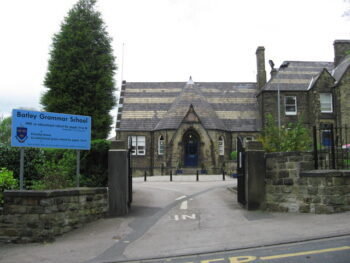
Batley Grammar School will no longer use images of the Prophet Muhammed when teaching Religious Studies (RS). That was the conclusion announced today of the School’s investigation into controversy over such an image being used in a recent lesson. The School has said it will take this approach because ‘it is committed to ensuring that offence is not caused’. Humanists UK has expressed alarm at a blasphemy law now effectively being in place, and the chilling effect this is likely to have on other schools.
Controversy erupted in March after a teacher showed pupils an image of Muhammad. This incident occurred in a lesson on blasphemy. It led to Muslims protesting outside the school gates. The teacher in question was suspended. He has now been reinstated.
An independent investigation into the incident has now found:
‘Difficult issues such as blasphemy are included in the curriculum offer, as these are key aspects of the provision, and are important learning points for all our young people. The image in question was used on 22 March as part of the “controversial issues” topic in the RS scheme of work for Year 9.
‘It has been confirmed that the image was used on more than one previous occasion. The image had been selected to supplement the scheme of work and was not included in the formal scheme overview. The Trust fully recognises the level of concern this has caused.
The independent investigation has concluded and the Trust has accepted that the teaching staff who developed and delivered the lesson genuinely believed that using the image had an educational purpose and benefit, and that it was not used with the intention of causing offence. Nevertheless, the Trust recognises that using the image did cause deep offence to a number of students, parents and members of our school community. The Trust deeply regrets the distress this has caused. The Trust also considers that the topics covered by the lesson could have been effectively addressed in other ways and without using the image.…
‘The Trust considers that its lesson planning processes could have facilitated a more holistic approach to the selection of teaching aids, taking more careful account of relevant factors which would include: …the need to respect and understand all faiths and no faiths
‘In the light of the above, and in respect of the views of our school community the Trust is clear that it is not necessary for staff to use the material in question to deliver the learning outcomes on the subject of blasphemy; or any such images of the type used on 22 March for use in any Trust RS lessons, or any other lessons…
‘The Trust will not avoid addressing challenging subject matter in its classrooms but it is committed to ensuring that offence is not caused…’
In October a Muslim extremist murdered the French schoolteacher Samuel Paty after he used an image of Muhammad in a lesson on free speech in an open society.
A Humanists UK spokesperson commented:
‘Schools should be able to show depictions of Muhammad. If done sensitively, this can be an important part of Religious Education.
‘High-quality RE should not merely seek to “respect all faiths” or avoid “offence”. If that is all it does then it cannot hope to equip young people to understand and navigate contemporary debates around religion. Schools are public bodies, charged with the education of children. They must open their minds by promoting critical inquiry and personal, intellectual, and moral development. This means they must cover criticism of religions in ways religious groups won’t like. And in the case of Islam, this means debates around depictions of Muhammad. Pupils can understand such debates much more easily if they see what all the fuss is about themselves.
‘If schools shy away from this responsibility, and instead reintroduce a blasphemy law that was repealed 13 years ago, that would represent an educational failure.’
Notes:
Read the executive summary of the independent investigation commissioned by the Trust.
Read more about our work on free speech and expression.
See our comment in response to the 2020 incident in France.
Humanists UK is the national charity working on behalf of non-religious people. Powered by 100,000 members and supporters, we advance free thinking and promote humanism to create a tolerant society where rational thinking and kindness prevail. We provide ceremonies, pastoral care, education, and support services benefitting over a million people every year and our campaigns advance humanist thinking on ethical issues, human rights, and equal treatment for all.
In 2021, Humanists UK is celebrating its 125th anniversary with a renewed focus on its history. The new website Humanist Heritage is a rich new web resource that uncovers the untold story of humanism in the UK – a story of people, groups, objects, places, movements, publications, and ideas.
